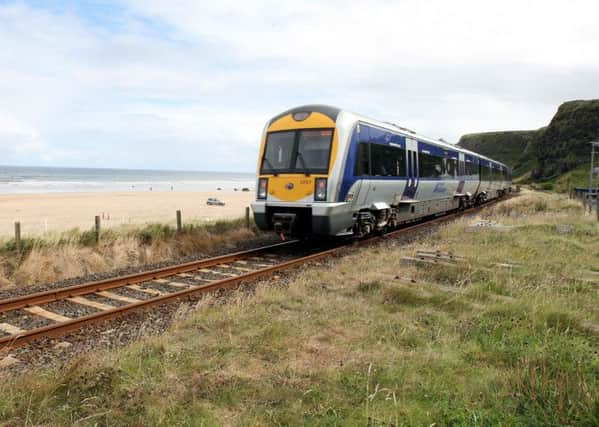Most scenic train journey in the world a major jobs mobility bar


That’s according to a new analysis of labour mobility in Northern Ireland, which was commissioned by the Department of Employment and Learning (DEL) and conducted by Oxford Economics.
‘Labour Mobility in Northern Ireland’ was compiled following consultation with unemployed workers and job centre staff in Londonderry.
Advertisement
Hide AdAdvertisement
Hide AdThree major employers, including Seagate in Londonderry, also contributed to the study.
Amongst its findings were that there were lots of jobs as well as unemployed people in The Diamond and Strand wards of the city and also that job seekers are rarely willing to commute within the city never mind move house for work.
“The Derry-Londonderry based Jobs and Benefits Office (JBO) staff confirmed that they rarely work with a claimant who is willing to move in order to obtain work,” the report states.
“They noted that it can sometimes be difficult to encourage some individuals to commute within the city, never mind to move house.
Advertisement
Hide AdAdvertisement
Hide Ad“Those who are younger and more qualified, particularly those with a higher education qualification tend to view the prospect of seeking work outside Derry-Londonderry more positively.
“Job Centre staff in Strabane expressed similar views, again suggesting that only those who are young and highly qualified may be open to the prospect of moving house,” it adds.
However, sectarianism is rarely a factor in dissuading applicants from taking jobs in different areas of Londonderry. A ‘chill factor’ based on the Troubles is seemingly a Belfast phenomenon although JBO staff here also reported that someone might very occasionally be reluctant to take a job in a particular area.
“Within the focus groups undertaken for this project, participants in Derry~Londonderry, Coleraine and Strabane did not consider any areas to be no-go‟ in terms of their job search,” it states.
Advertisement
Hide AdAdvertisement
Hide AdIn both Strabane and Londonderry job centre staff said they seldom encountered a ‘chill factor’ although it would have been more common 15 years ago.
“At the same time, however, they noted the river in Derry-Londonderry can be a significant divide and a concern for some people who are reluctant to work on a particular side.
“In the past this was due to religious reasons. Now they are not necessarily scared of crossing the river, but they perceive it as much more remote than its distance implies,” the report states.
Remarkably, the report predicts job growth will outstrip the working-age population over the next decade and that we’re going to have to import people to fill vacancies.
Advertisement
Hide AdAdvertisement
Hide Ad“Belfast and Derry-Londonderry will need to import‟ more workers from elsewhere in Northern Ireland, either through increased commuting or migration. Job prospects in many rural areas are unlikely to improve and could actually worsen in many cases,” the report adds.
The cost or paucity of transport are also significant blocks to people from the North West travelling to work.
A job seeker from Londonderry said: “Distance is not the important thing; it’s just the cost of travelling for me.” A counterpart in Strabane said: “I wouldn’t travel all the way to Belfast for a job that I could be doing here for the same money because of the cost of travel.”
The report found that participants based here were more inclined to restrict their job searches to the city, or towns on main transport routes.
Advertisement
Hide AdAdvertisement
Hide Ad“The Derry-Londonderry JBO staff also highlighted the poor transport links between Derry~Londonderry and Belfast: a train journey can take almost three hours to cover 70 miles.
“The route is promoted as scenic, but this has little value to daily commuters. The JBO consultees drew a contrast where a commute of that distance might not be unusual in southern England, where transport links are much faster.
“They believed that if there was a motorway or fast train between Derry-Londonderry and Belfast commuting between the two cities would become a viable option,” the report states.